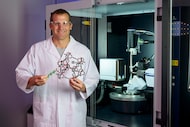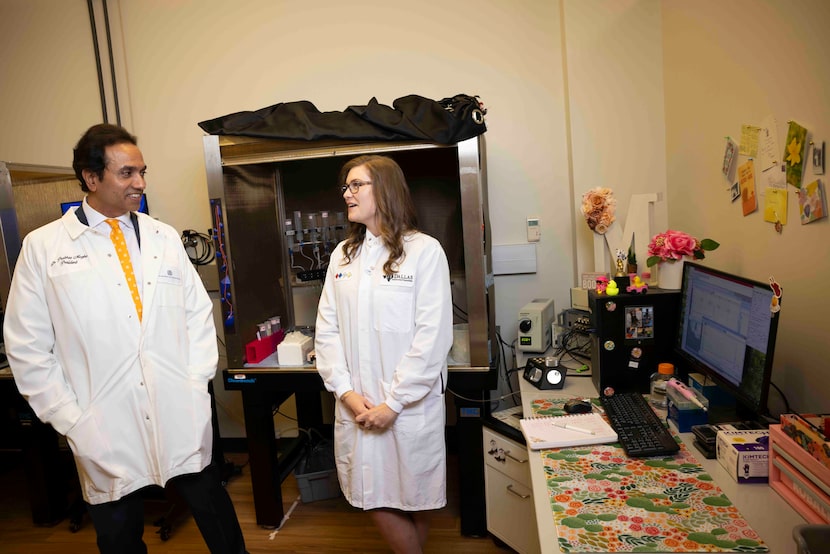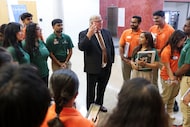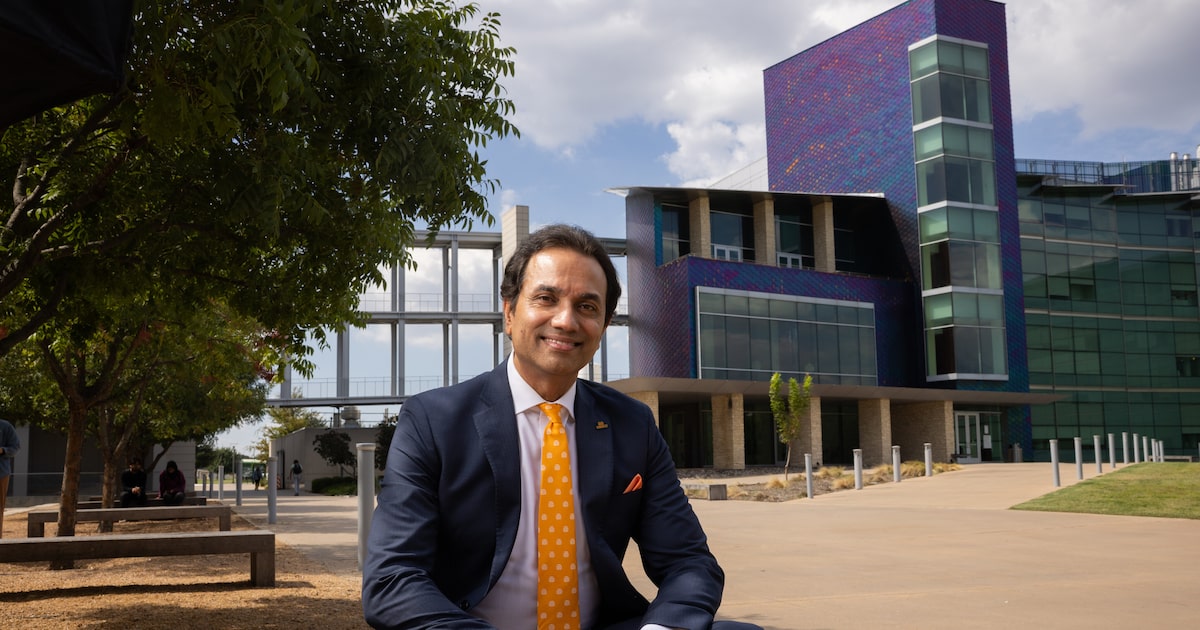RICHARDSON — In a bright neurobiology lab at The University of Texas at Dallas, Prabhas Moghe peered over a graduate student’s shoulder as she examined recordings of electrical impulses from human nerve cells.
Among the microscopes, test tubes and scientists solving society’s most complex health challenges, such as cancer or, in this case, migraine pain, Moghe feels at home. An accomplished bioengineer who has developed medical technologies, he was at Harvard Medical School as a postdoctoral researcher and spent the last 30 years at Rutgers.
The University of Texas at Dallas is one of the premier universities in North Texas, with increasing enrollment and federally funded research. A new president could transform the future of the university and the region.
His white lab coat has a new title embroidered in neat script above the pocket — “President.” His office is across the street from the bioengineering hub, nestled in the second floor of UT Dallas’ Administration Building.
Moghe, 58, became UT Dallas’ sixth president in August after serving as Rutgers’ executive vice president for academic affairs. He takes the helm at a challenging time for higher education. Under increased scrutiny from state and federal leaders, universities face rising political and financial pressures. Americans’ perceptions of the importance of higher education continues to decline, according to a recent Gallup poll.
The Education Lab
Moghe isn’t daunted by those challenges. He understands much of the job will be proving UTD’s value to the region.
“If we can make sure that students that come to us succeed, there will be trust in us. If our research work is solving the problems of humanity — that doesn’t come in different political affiliations, it’s across all stripes — we will have support,” Moghe said. “So my view is nose to the grind, focus on the work and stick to the academic mission.”
For Moghe, the school’s future is informed by its origins as a research and industry partner to Texas Instruments. He’s turning to what he knows best, and what the fast-growing university has quickly distinguished itself for: groundbreaking research that changes people’s lives.
Moghe points to the graduate student’s research on migraines, which will hopefully lead to a drug that can quell the daily pain millions of Americans suffer from. That kind of work, he says, “represents the nucleus of an academic institution today.”
The approach could cement the young university as a player on the national stage.
“UTD is at a crux. It is ready to spring forward,” said University of Texas System Regent Christina Melton Crain. “We were really tasked with finding that person who could catapult the university into the next realm. And he walked in the room and it was like, ‘Wow, I think this guy is the guy.’”
“Drinking the water out of an innovation fountain”
Raised in Bombay, India, before coming to the U.S. for graduate school, Moghe has spent all of his adult life working in universities, thinking about what it takes for a person to be innovative.
He spent hours in labs as a postdoctoral researcher at Harvard Medical School in 1993, where he was captivated by the unpredictability of biology.
In the evenings, he would set up cell experiments to run overnight, before rushing to make the last shuttle home. When he returned each morning, the suspense was unbearable. Not knowing what the experiments would reveal thrilled him.
Related

In 1995, he became a biomedical engineering professor at Rutgers, New Jersey’s flagship public university. He felt that same anticipation — of the wonders of humanity or new technologies that research could uncover — as he watched his graduate students peer through microscopes in his lab.
“It’s not going through a short course on innovation that makes you innovative,” he said. “It has to do with your immersion in a place. It’s like drinking the water out of an innovation fountain. We’ve got to create those spaces in our universities.”

University of Texas at Dallas’ new president Prabhas Moghe speaks with Mandee Schaub, a graduate student, about her research at a neurobiology lab on the school’s campus in Richardson on Tuesday, Sept. 30, 2025.
Juan Figueroa
Moghe quickly rose up Rutgers’ ranks, garnering a reputation for his ability to create cross-disciplinary research opportunities.
As a young professor, he landed a significant National Science Foundation grant for a project that brought several dozen faculty members across STEM fields together to work on biological interfaces. Later, as the school’s chief academic officer, he launched a program that set aside millions in institutional funding for researchers to work with faculty from other academic fields or a different Rutgers campus.
“Fundamentally, what excites me about academia is breaking down its walls and building bridges,” Moghe said.
Rutgers Dean of Engineering Alberto Cuitiño said he could tell early in Moghe’s career that he was bound for a leadership role in academia.
“He was probably one of the youngest faculty in the school to reach the rank of distinguished professor,” Cuitiño said. “Then we started seeing his interest in bringing people together and thinking out of the box — and doing it well.”
Even as he took on new roles, Moghe spent much of his three decades at Rutgers immersed in teaching and research. When he became Rutgers’ chief academic officer, he kept his lab running, an unusual move for a university leader. Gold-brushed plaques of his patents, including one for a treatment for atherosclerosis, the narrowing of arteries’ walls, line the shelves of his presidential office at UTD.
His work has led to technology that can better detect small clusters of cancer cells in order to extract them — an invention driven by his wife’s experience with breast cancer — and potential therapies to treat brain degenerative disorders, such as Parkinson’s.
Moghe has long viewed his role as a connector between academic disciplines; his own research spans fields, including chemistry, engineering and biology. Now he wants to bridge academia and industry, bringing UTD’s research in line with the needs of the region’s growing companies.
“I am really very comfortable in the interstices of fields, in sort of the spaces in between,” he said. “That actually is a very helpful skill set, because life is like that.”
“Startup company meets academia”
Moghe has inherited a university on the rise. UTD, which turned 56 in September, has emerged as one of the fastest-growing institutions in the nation.
The school, which has long aimed to be a research powerhouse, saw dramatic advances under Moghe’s predecessor, Richard Benson, including enrollment growth and a doubling of federally funded research expenditures to more than $80 million in 2024. Nearly 30,000 students now attend UTD’s seven schools. (UTD is a supporter of the Education Lab at The Dallas Morning News.)
Related

Business and community leaders call UTD the best-kept secret in Texas’ higher education world. Moghe’s task is to reveal it, catapulting the university onto the national stage.
“It’s about becoming known as a real leader and a place that students want to attend,” said Crain, the UT System regent. “Not that they didn’t before, but this needs to be a destination institution.”
Crain, who served on Moghe’s selection committee, said she was drawn to his track record of elevating a school’s prestige. Under his five-year tenure as chief academic officer, Rutgers moved up 22 slots to the 15th-best public university in the U.S. News and World Report rankings.
His deep understanding of the insular world of research — and his work to help boost Rutgers’ research funding by 40% to nearly $1 billion — also appealed to the Board of Regents at a time when federal funding is in flux. UTD lost around $10 million — about 5% of its annual research expenditures — in the Trump administration’s recent federal funding cuts.
“That caught our attention,” Crain said. “Obviously, there are a lot of things out of our control and we’re dealing with it the best we can, but the fact that he understands and has been down that road before, has done an increase, has been involved in the research arena … is super important.”
Moghe likes to say he left one of the oldest public research institutions in America to come to the youngest. He describes UTD as a “startup company meets academia.”
“I’m interested in the directionality of the institution,” he said. “Because we grew. We all know we grew. And now the question is, where do we want to lean?”
Related

One direction Moghe is charting brings the school back to its roots as an industry partner.
Created in 1961 by the founders of Texas Instruments, the university was initially a workforce training and research arm of the semiconductor company. In the decades since, the company has given millions of dollars to the university to advance research, open STEM buildings and support faculty members.
“I’m very captivated by this idea that UT Dallas had innovation in its mindset as it was conceived,” Moghe said.
His vision is for UTD to be a strategic partner to industries across the region, including the life sciences and health technology, energy, transportation and microelectronics sectors. Students and faculty would work with companies to conduct research that addresses the future problems companies are bracing for.
“A lot of us have industry as our partners, but a strategic partner is different,” he said. “It’s one with whom you can be vulnerable. Industry will come to us and say, ‘Help us become resilient.’”
The approach will require Moghe, who has no roots in the region, to build connections with local industry leaders.
The investment, he says, will pay off in immersive, experiential learning for students, elevating UTD to be “an exemplar for what high value, high trust education looks like.” Students won’t be working on “canned problems we pick out of a textbook,” he said. They’ll be able to solve real-world issues that matter to them.
Strategic industry partnerships could also help UTD secure more funding, both through research contracts and state investments.
“Convergence is a value, and what it means is that everyone’s not marching to the same tune, but the arc of movement is trending in the same direction,” Moghe said. “I want academics, researchers and people from industry to converge on solving problems where we have a common goal in this space. That’s what I’m dreaming of.”
“We would be a place where industry would come to us and say, ‘We have this large, grand challenge,’” he said. “‘Help us solve it.’”
An optimist
Before he can forge connections with industry leaders, Moghe will have to earn the trust of faculty and students as a new era of state and federal reforms reshapes higher education.
Ongoing budget constraints, driven in part by visa restrictions and federal funding cuts, has the community worried about how campus life could change. In July, prior to Moghe’s arrival, university officials abruptly eliminated the track and cross country teams, citing the school’s financial challenges. They were reinstated days later, after feedback from the community and the UT System administration.
Around 1,000 fewer international master’s students are attending UTD this fall, a loss that amounts to nearly 20% of the school’s 5,600 international students it had last fall. The university offset some of the lost international student tuition revenue with gains in undergraduate enrollment, release of previously earmarked reserves and cost containment measures.
“We will have a constrained budget the year ahead,” Moghe said. “But does that mean that it’s stifling our ability to innovate, to invest, to think about strategies? No.”
Professors say the power they typically wield to help shape universities’ academic missions is shrinking under a new law, while students question how freedom of speech will be regulated on campus. They wonder whether Moghe, when faced with the increasing influence conservative lawmakers are exercising on universities, will stand up for them.
Related
Colleagues and faculty at Rutgers say Moghe is a skilled communicator who can tactfully navigate the competing interests of a university’s constituents.
Former Rutgers president Jonathan Holloway said he tapped Moghe to be his second in command — a role that oversaw academic, research and faculty programs — in part because of his “soft political skills.”
“He’s really affable. He’s very charming. He’s got a very calm manner about him,” Holloway said. “You’re dealing with people who are feeling anxious about their research or resources all the time, and you want to be a reassuring voice while balancing them against other people’s concerns.”
In 2023, after faculty and graduate student workers at Rutgers went on strike following a year of unsuccessful bargaining, Moghe was praised by both union leaders and Holloway for his role in negotiating a new contract.
While discussions with other university officials stalled, bargaining on faculty promotions and professional development funds moved when Moghe’s delegates came to the table, said Heather Pierce, an adjunct professor in Rutgers’ political science department and a union leader.
“These [provisions] were the ones that were the exception to the rule,” Pierce said.
Holloway said he was “impressed” by how Moghe negotiated with — and at times advocated for — adjunct faculty and graduate and postdoctoral students, who demanded pay increases and job security, while balancing the school’s budget.
A year later, when Holloway was called to testify in front of Congress about pro-Palestinian demonstrations on campus, Moghe was among those who helped him prepare for the hearing, said Rachel Corson, who sat on the board of the Big Ten Academic Alliance, a consortium of universities, with Moghe.
“He and I talked about how to prepare his president to do the best job he could, to stay true to the university’s mission, and to convincingly convey the value that the university provides, even to its skeptics,” Corson said.
Now Moghe has turned to Holloway — who stepped down from Rutgers earlier this year, citing the personal cost of the job after a turbulent term — for advice on how to lead a university. The pair has talked frequently in the last two months.
“You’ve got to wonder why people want these jobs right now,” Holloway said. “But one of his great strengths is that he’s an optimist. That kind of attitude — that faith that it’s going to get better — gives you the ability to weather really difficult moments.”
Moghe believes he can change people’s minds about the value of higher education, or at least that of UT Dallas. He sees his role as a storyteller, recasting the American tradition of the research university as the engine of innovation.
“I am seeing the promise of this institution in ways that perhaps are less evident to people on the inside,” he said, leaning back in his chair and smiling.
He paused. The question of how far that optimism will carry him hung in the air.
“Now does that work have to happen?” he said. “You bet.”
Prabhas Moghe
Age: 58
Birthplace: Bombay, India
Residence: Dallas
Career highlights: Rutgers University, 1995-2025: assistant professor, associate professor, professor; director, Rutgers-University of Medicine and Dentistry of New Jersey Graduate Program in Biomedical Engineering; vice chair, Department of Biomedical Engineering; distinguished professor, Department of Chemical and Biochemical Engineering, Department of Biomedical Engineering; vice chancellor for research and innovation; executive vice chancellor for research & academic affairs; executive vice president for academic affairs and chief academic officer.
Education: Bachelor’s degree in chemical engineering from the University of Bombay; doctorate from the University of Minnesota; postdoctoral research in bioengineering completed at Harvard Medical School/Massachusetts General Hospital.
Family: Married to Ameena, a biologist who founded a company around cancer imaging, for 33 years. Two children, Ryhan, 25, and Sania, 20, and a shelter dog named Max.
Hobbies: Has played the sitar, a stringed instrument used in Hindustani classical music, since he was 8. Loves to garden. On some nights, you can find him at Dallas’ local nurseries, looking at plants in the dark under the beam of his cellphone’s flashlight.
The DMN Education Lab deepens the coverage and conversation about urgent education issues critical to the future of North Texas.
The DMN Education Lab is a community-funded journalism initiative, with support from Bobby and Lottye Lyle, Communities Foundation of Texas, The Dallas Foundation, Dallas Regional Chamber, Deedie Rose, Garrett and Cecilia Boone, Judy and Jim Gibbs, The Meadows Foundation, The Murrell Foundation, Ron and Phyllis Steinhart, Solutions Journalism Network, Southern Methodist University, Sydney Smith Hicks, and the University of Texas at Dallas. The Dallas Morning News retains full editorial control of the Education Lab’s journalism.

